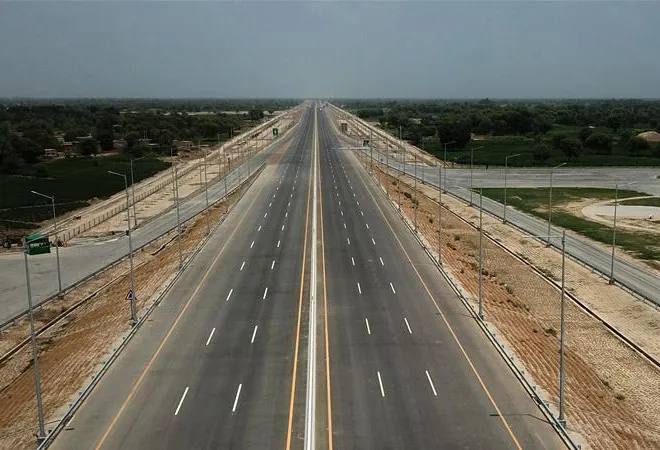-
CENTRES
Progammes & Centres
Location
India has raised objections to the possibility of China and Pakistan involving third countries in the CPEC.

India’s position on the BRI. From the time of its initial launch in 2013, India has opposed the BRI because one of the core components of the initiative, the CPEC, is seen as violating India’s sovereignty and territorial integrity. While the Indian position remains unchanged, China and Pakistan are keen to invite third parties into the CPEC, highlighting China’s insensitivities to India’s concerns. The initiative is planned to be completed by 2049, coinciding with the centennial of the founding of the People’s Republic of China. But this has not received the kind of approval that China had hoped for. India’s opposition to the BRI primarily stems from the CPEC. India has also been concerned with the economic non-viability of many of the BRI projects that have led to “debt trap” situations in countries like Sri Lanka. In a response to a question on the BRI in the Indian Parliament in August 2017, the minister of state for foreign affairs at the time said that the Indian government “is of firm belief that connectivity initiatives must be based on universally recognized international norms, good governance, rule of law, openness, transparency, and equality, and must be pursued in a manner that respects sovereignty and territorial integrity.” The statement also added the Indian concerns on the CPEC as it “passes through parts of the Indian state of Jammu & Kashmir under illegal occupation of Pakistan.” That China was proceeding with the initiative, the government argued, “reflects lack of appreciation of India’s concerns on the issue of sovereignty and territorial integrity.” In April 2017, India again explained its position, stating that China’s pursuit of the CPEC reflected its “lack of understanding and appreciation of India’s concerns on the issue of sovereignty.” The statement further clarified that the government had repeatedly articulated that “Pakistan has been in illegal occupation of parts of the Indian state of Jammu & Kashmir since 1947. Government has conveyed to the Chinese side, including at the highest level, its concerns about their activities inIndia’s opposition to the BRI primarily stems from the CPEC. India has also been concerned with the economic non-viability of many of the BRI projects that have led to “debt trap” situations in countries like Sri Lanka.
India has been consistent and unambiguous in its position on China’s BRI projects. That China had decided to pursue these projects in the face of this position reflects a short-sighted view, thus pushing India into an anti-China bloc much faster. India made similar statements in 2019, 2020, and earlier in 2022 as well. Continuing with this stand, the MEA spokesperson responded last week to questions on the possible expansion of the CPEC to include third countries by saying that “no third country should be involved in itChina’s Ministry of State Security asked Pakistan to permit a private security company in Pakistan to safeguard the Chinese citizens working in the country.
China has voiced its concerns to Pakistan over the safety and security of Chinese citizens working on various CPEC projects. The number of incidents targeting Chinese citizens in Pakistan has been worrying to Beijing. In June, China’s Ministry of State Security asked Pakistan to permit a private security company in Pakistan to safeguard the Chinese citizens working in the country. While Pakistan has not granted permission, the worsening security conditions will compel the government to rethink its approach, and Chinese security forces in larger numbers can become a reality, which will raise its own issues with India. Outside of such ceaseless complaining, which clearly falls on deaf ears in Beijing and Islamabad, India appears unwilling to contemplate any other action, which will no doubt mean that third-parties have little to worry about in New Delhi’s reaction. These developments come against the backdrop of Indian plans to host some of the G-20 events in Jammu and Kashmir in 2023. India will start its presidency of the G-20 on December 1. China and Pakistan have reportedly raised objections to India’s decision to hold meetings in the disputed region. China went on to say that “relevant parties should avoid complicating the situation with the unilateral move.” China’s continuing activities in the Pakistan-occupied Kashmir and Gilgit Baltistan could be particularly concerning given their objections. Overall, China-Pakistan projects, including the CPEC and its possible expansion to include third countries in the coming years, could impact relations in the region. But since India is unlikely to react in any meaningful manner to counter these developments, these are likely not be too serious.China and Pakistan have reportedly raised objections to India’s decision to hold meetings in the disputed region.
The views expressed above belong to the author(s). ORF research and analyses now available on Telegram! Click here to access our curated content — blogs, longforms and interviews.

Dr Rajeswari (Raji) Pillai Rajagopalan was the Director of the Centre for Security, Strategy and Technology (CSST) at the Observer Research Foundation, New Delhi. Dr ...
Read More +